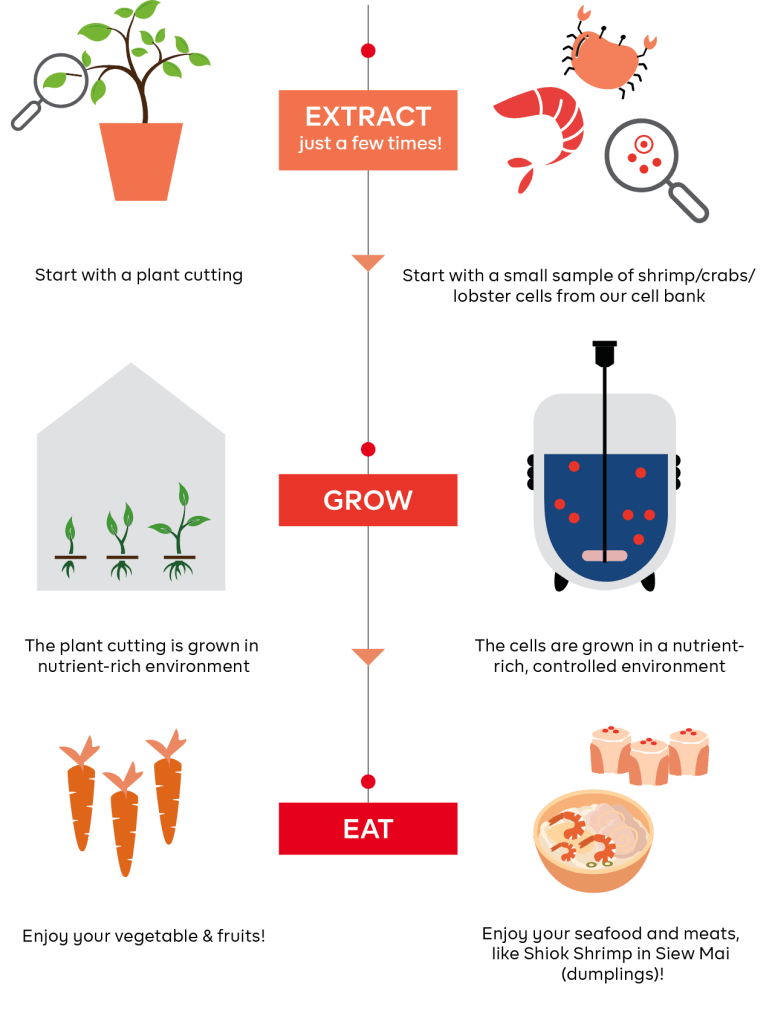Over 95% In Hong Kong Want To Try Cell-Based Meat and Seafood: Study
6 October 2021October 6, 2021 – More than 95% of people in Hong Kong are willing to try cell-based proteins, Shiok Meats’ new study has revealed. The research found food safety and security concerns were the biggest motivator among Hong Kong residents, with sustainability reasons also a top driver. The results of the study have been published exclusively on Green Queen Media.
An overwhelming majority of Hong Kong residents say they are interested in trying cell-based meat and seafood because of food safety and the environment, finds a new consumer survey. The poll was conducted by Singapore cell-based seafood startup Shiok Meats using a third-party survey tool, drawing on data collected from a representative sample of 1,209 participants in the city aged between 15 and 65.
Shiok Meats also owns Southeast Asia’s first cultivated red meat company, Gaia Foods.
Food Safety, Security, Sustainability – Top Motivators for Cultivated Meats Adoption
The survey, which was carried out in early 2021, showed that food safety and security was the top-cited reason for Hong Kong consumers’ interest in cell-based proteins. Of the 95.9% of respondents who said they were interested in cell-based meat and seafood after a simple infographic explainer about the novel alt-protein, 43% cited food safety as their primary motivator.
Sustainability came in second, with the lower environmental impact of cell-based proteins appealing to 40% of the respondents who indicated willingness towards the novel product.
Infographic about cell-based protein production shown to respondents of the survey.
Many of the respondents still ate conventional meat in their diets, with over 46% self-identifying as omnivores, and just over 26% representing flexitarians—indicating that interest in alternative proteins is not only coming from vegetarians or vegans, but mainstream swathes of the population.
Hong Kong consumers already know cultivated meat
The results, which follow on from Shiok’s previous consumer research conducted among Singapore residents, revealed that Hong Kong consumers are generally already familiar with the concept of meat that has been cultivated directly from cells.
In the former Singapore study, Shiok’s research showed that 56% of people in the city-state had prior knowledge of cell-based technology. In Hong Kong, this figure was as high as 87%. Researchers noted that this “may not only reflect the attractiveness of the Hong Kong market but may also indicate the growing consumer awareness of cell-based meat and seafood across APAC,” given the regulatory developments since Shiok’s initial Singapore study carried out in 2020.
Shiok’s Hong Kong study showed that consumer awareness of cultured meat was correlated with respondents’ willingness to try the novel product. Nearly two-thirds (63%) of Hong Kong respondents said they would be interested in eating cell-based proteins at least 1-3 times per month—and 20% of this group were open to consuming cell-based meat even more frequently at 1-3 times per week.
“Our survey indicates that the more familiar respondents were with cell-based proteins, the more likely they were to adopt it, reiterating the importance of educating the consumer in this industry,” said the study.
Health-conscious, young females: the early adopters
The survey additionally pinpointed the “early adopters” of cell-based meat and seafood in Hong Kong—the demographic most likely to purchase and consume the novel product, even for a premium as the burgeoning sector, with many startups still in pilot production stage, begins to scale.
In Hong Kong, the early adopters are likely to be females, young millennials and Gen Zs, educated and health-conscious. Millennials, for instance, were willing to pay as much as a 75-100% premium for cell-based products, more than any other generation. Those who are practicing vegans or have already tried plant-based meat substitutes are also more likely to buy and try cell-based meats.
These findings align with Shiok’s Singapore poll, which identified young, well-educated, and sustainability-focused consumers as the early adopters in the city.
The consumer poll sheds light on the need for cultivated protein companies to consider local differences as they look to expand and export their products in the future. For instance, food security concerns were less prominent among Singaporean respondents, who mainly prioritised the sustainability advantages and were motivated to try cell-based seafood due to curiosity.
Read the exclusive study published on Green Queen!
https://www.greenqueen.com.hk/hong-kong-cell-based-meat-study/





